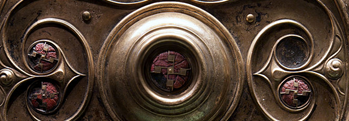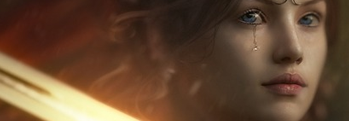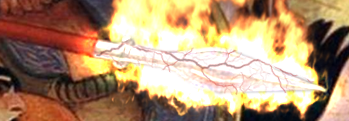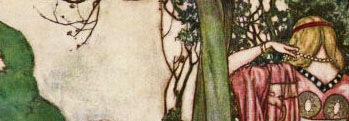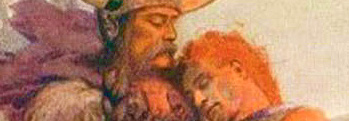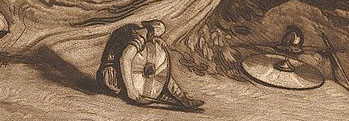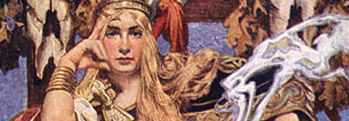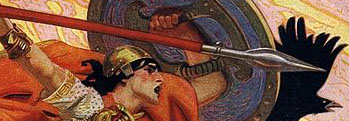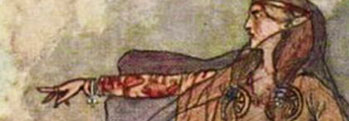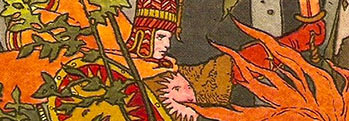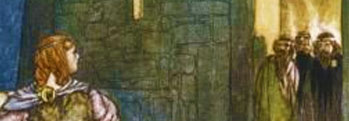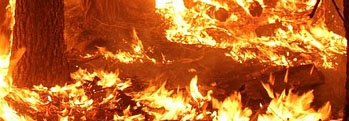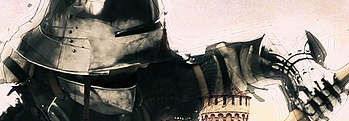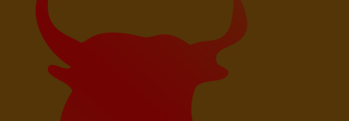The Feast of Bricriu
Irish and Celtic myths and legends, Irish folklore and Irish fairy tales from the Ulster Cycle
A surprise awaits the heroes at The Feast of Bricriu
Bricriu of the venomous tongue he was called, and well named indeed he was, for he loved nothing better than to cause trouble and spread rumours and half-truths to unsettle people. As such he decided to hold a great feast, although he knew that by his reputation few would be interested in attending, so he made a special effort to entice them.
 He built a great hall of splendour, taking him a full year in the building, bedecked it with rare tapestries and scented with oils from the farthest misty lands. In the front part of the hall there was a royal seat made for Conchobar, high above all the other seats of the house. It was set with sapphires and other precious stones of all colours that glimmered with starlight and meadow sun, so that they made the night the same as the day, and round about it were the twelve seats of the twelve heroes of Ulster. Then he told King Conchobar and his followers to join him. Even, he said, he'd built a special room for himself off to one side so they wouldn't have to listen to him speak during the feast!
He built a great hall of splendour, taking him a full year in the building, bedecked it with rare tapestries and scented with oils from the farthest misty lands. In the front part of the hall there was a royal seat made for Conchobar, high above all the other seats of the house. It was set with sapphires and other precious stones of all colours that glimmered with starlight and meadow sun, so that they made the night the same as the day, and round about it were the twelve seats of the twelve heroes of Ulster. Then he told King Conchobar and his followers to join him. Even, he said, he'd built a special room for himself off to one side so they wouldn't have to listen to him speak during the feast!
And the King rolled his eyes and said, "We will not go, for if we do, our dead will be more than our living after Bricriu has set us to quarrel with one another." But Bricriu was enraged after all his effort and said to the King, "I will stir up anger between father and son, so that they will be the death of one another," said Bricriu; "if I fail in doing that, I will make a quarrel between mother and daughter. If that fails, I will put the two breasts of every woman of Ulster striking one against the other, and destroying one another!" And he could do it too.
Such dire and baleful threats were not to be taken lightly, so the men of Ulster talked amongst themselves and considered how best to respond. Rather than risk further stirring up the ire of Bricriu, they sent eight strapping fellows to escort him from the hall directly after he'd laid out the feast, that way he wouldn't have a chance to muddy the waters of friendship.
Undeterred, Bricriu set his wily mind to considering how he might cause trouble without even being there! The crafty fiend spoke seperately to each of the three mightiest champions of Conchobar, telling them the hero's portion of the feast belonged to them and them alone. And it was no mean portion either, as he said "for it is not the portion of a fool's house. There goes with it a vat of good wine, with room enough in it to hold three of the brave men of Ulster. With that a seven-year-old boar, that has been fed since it was born on no other thing but fresh milk, and fine meal in spring-time, curds and sweet milk in summer, the kernel of nuts and wheat in harvest, beef and broth in the winter. With that a seven-year-old bullock that never had in its mouth, since it was a sucking calf, either heather or twig tops, but only sweet milk and herbs, meadow hay and corn, and along with that, five-score wheaten cakes made with honey. That is the Champion's Portion of my house!"
The three champions in their pride swore that the portion of the hero would belong to them, that was Conall, Cú Chulainn, and Laegaire, and by tradition they'd have to fight to claim it. So even before the feast had begun the seeds of dissent had been sown.
And sure enough on the day of the feast, as Bricriu was leaving the hall at swordpoint, he turned and said over his shoulder, "The Champion's Portion of my house is not the portion of a fool's house, let it be given to whoever you think the best hero of Ulster!"
Great trouble there was as the three champions wrestled and argued as to who should have the hero's portion, each proclaiming his virtues and downplaying the vantage of the other, and it could well have come to blows and worse grief had not Sencha the wise stepped in, for none others dared come between such limb-cracking warriors.
Sencha advised, "for this night to divide the Champion's Portion among the whole gathering, and after that to let it be settled according to the judgment of Ailell, king of Connaught, for it will be better for the men of Ulster, this business to be settled in Cruachan."
And so they agreed and feasted and drank, making merry.
Not to be so readily thwarted, Bricriu brooded in his chamber, seeing his game go awry, until he happened to spot out the window the approach of Fedelm of the Fresh heart with fifty women alongside her. "Aha," he thought, "here lies my chance!"
 The ladies had taken a little too much mead in their journey to his house to he set out and took aside the three fairest, saying to them "I would not think well of it that any of the women of Ulster should go before you into the hail, for it is at your heel that all the other women of Ulster should walk. If you go first into the hall to-night; you will be queen over them all for ever and ever."
The ladies had taken a little too much mead in their journey to his house to he set out and took aside the three fairest, saying to them "I would not think well of it that any of the women of Ulster should go before you into the hail, for it is at your heel that all the other women of Ulster should walk. If you go first into the hall to-night; you will be queen over them all for ever and ever."
So he spoke to Fidelm of the Fresh Heart, Emer the Beautiful and Lendabair the Favourite, wrapping his words in many fine flatteries and much fulsome praise, so that the women would be mazed and confused. Getting the general idea however they began to pick up the pace, eventually running with their skirts hiked up to their waists before falling into quarrel outside the hall of Bricriu.
As loud and fierce as their argument was, the men within thought themselves besieged, and they leapt to arms, quickly barring the hall with a stout oaken beam and casting many a narrow glance at one another. Yet when the expected attack failed to burst through the walls, Cú Chulainn peered out a crack and said to the rest that it was their wives and daughters along with their followers having their own strife.
Well the men of course decided to help their women, so Conall and Laegaire tore down the pillars of the house to clear the way. Cú Chulainn, not to be outdone, lifted the entire structure in the air, thus opening a path for his wife Emer to enter first, slamming it down afterwards so it sank seven feet deep in the earth.
Such was the force of his action that Bricriu was hurled from his perch to land face down in the mud outside. Coughing and unrecognisable even in his party finery, he stalked into the house and demanded in a loud voice that his fine hall be set straight again. Not a bite of food nor a sup of wine would pass the lips of any until it was done, he said. Cú Chulainn, recognising the villain of the piece, lost the plot entirely at that stage and had to be doused in icy water until his battle fury subsided, and then he righted the building.
And for three days after they feasted. Cú Chulainn did nine feats with apples, nine with spears, and nine with knives, without ever letting one touch the other. And he took three times fifty needles from the women, and threw them up, one after the other, so that each needle went into the eye of the other, and in that way they were all joined together. Then he gave every woman her needle back into her own hand.
 But of course the seeds of strife bear slow fruit, and bitterness still seethed in the hearts of the three champions until it had been decided which one was the mightiest. As they had agreed, they left the decision to King Ailill, who upon deliberation named Cú Chulainn as the mightiest champion.
But of course the seeds of strife bear slow fruit, and bitterness still seethed in the hearts of the three champions until it had been decided which one was the mightiest. As they had agreed, they left the decision to King Ailill, who upon deliberation named Cú Chulainn as the mightiest champion.
This was no good to the other two however, and they quarreled, so he bid them begone from his hall and go to Cú Roí Mac Dáire to arbitrate their vanity. And so they went and again, they couldn't agree, so they retired back to Emain Macha. None could prove a definitive strength over any of the others.
Then a giant came to them, vast of body and vile of stench, rank and gnarled with age. He laughed and them and made light of their prowess, laying down a challenge - he would allow them to cut off his head if they in turn agreed to allow him to cut their heads off the following night. Thinking him mad they agreed, and Conall had his head off with one stroke. Picking up his head, the giant strode out the door to the astonishment of all.
The next night he returned bearing a sharp axe that was pitted with age and old gore, but Conall had made himself scarce, so Laegaire took his swing, again beheading the giant, and again the giant walked away with footsteps like the tread of doom. When he came back the following night, Laegaire was off out the back window in a terror, and who could blame him.
So it was left to Cú Chulainn to prove his mettle, and he sliced the head clean off the giant, who a third time stalked into the night. Upon his return, Cú Chulainn smiled and laid his own head on the block, awaiting the axe. The giant raised it up to the rafters, then laid it gently down beside the champion, saying "Rise up, Cú Chulainn. Vain is it for any warrior of Ulster or Ireland to seek to contend with you in bravery, and prowess and truth. Henceforth, to you shall belong the primacy of the warriors of Ireland and the curadhmhír, the champion's portion is your rightful claim."
The giant was none other than Cú Roí Mac Dáire who had come to vindicate his previous judgement. And so was the mischief of Bricriu undone, and the skill and wisdom of the men of Ireland prevailed.
Shown on the map below is where the tellers of tales lay Bricriu's hall.
Further Tales from the Ulster Cycle
Alone in County Louth rises a tall standing stone, its only company the ravens overhead and the whispering wind given voice by nearby trees. This is Clochafarmore, which means "the stone of the great man". It was first raised during the bronze age and rises to ove three meters in height, in a place whose name means The Field of Slaughter, ... [more]
War and the arts of war much occupied the people of Ireland, who became renowned for their skill with weapons and in the ways of battle. They fought one another and the many invaders who came to this land, earning not only fame for their arms and the swords and spears they carried, but for their shields as well! Some of the most legended shields ... [more]
Irish legends have this peculiar property – so long and so often have they been repeated down through the millennia that oftentimes one tale might cross into another, over and back, and leave its track behind. Some stories are far older than they might seem, and some contain shadows and echoes stretching back to the very beginning. Such is ... [more]
Bláthíne, whose name means “little flower” in Irish, was one of the ladies of the Tuatha Dé Danann, that mystical race of warlocks whose hardened red-gold bronze had shimmered in the sunshine when they ruled Ireland. Her beauty was famed throughout this world and the otherworld, but her story is a warning to all who ... [more]
It was often the way in olden times in Ireland that women would fight alongside the men, fierce and unbowed, and accorded the honour of warriors too. So it was with the fearless Scáthach, the legendary Scottish warrior woman whose name meant "the Shadow"! She lived in a sinister castle called Dún Scáith, or the For ... [more]
Many and infamous were the weapons of the tribes of Ireland, and fierce the warriors who wielded them in battle, but few were as notorious as the spear of fire and poison, the Lúin Cheltchair, which thirsted for blood so much that it had to be kept in a cauldron of poison, held down with chains by four foreigners – for who would risk t ... [more]
Cúchulainn, although still a young man, had made many powerful enemies, but none more bitter and dark than Queen Medb of Connaught, whose armies he had routed and whose ambitions he'd thwarted. Long into the dark nights of winter, year after year she brooded on the humiliations visited upon her, for undying is the wrath of a Queen. Sh ... [more]
Queen Medb had invaded Ulster and the lands of the north, thinking it would be an easy victory since the men of Ulster were crippled with birth pangs as a result of a curse place on them, but Cúchulainn had dogged her every step savagely. Attacking her supply wagons, ambushing her men from the trees, burning tents at night, he fought sing ... [more]
Queen Nessa had been known as a gentle and sweet natured woman when she was a maid, but through the hardships of the world she became cold and ruthless. Still, for all that she was still a rare beauty and an indomitable warrior, which many men find to be an irresistible combination! And so it was with King Fergus Mac Ríoch, master of all ... [more]
They say the fury of a storm in a high tempest has nothing on the fury of a woman scorned, and few women have ever felt quite so scorned as Aoife the warrior-queen after she found out that her lover Cúchulainn had married another woman, Emer! She had borne a son for him, but in her wrath she decided to turn the child against him. She spok ... [more]
In the age of heroes, forgotten by all but the storytellers and the legend-weavers, when champions strode the land of Ireland, their halls and Duns now covered in moss, echoing to no songs but those of the blackbird and the red-breasted robin, the people of Ulster were gathered together for a great celebration at Emain Macha, the capital of Ulster. ... [more]
A quarrel arose between Queen Medb of Connacht and the King of Ulster regarding who had the most wealth, but all of his men were cursed with the pains of a pregnant woman giving birth so they couldn't ride out to meet her marching army. Only Cúchulainn who had the blood of the Sidhe running through his veins could even walk, let alone fi ... [more]
Cathbad the Druid was well known throughout the lands of Ireland for his subtle skill and cunning ways, he could make birds speak the language of men and the very stones themselves sing, it was said! But like all Druids, he could also tell the portents of the day, as the ripples may be seen from a rock cast into a still pool in the deepest forest. ... [more]
Cruinniuc was a farmer in the northern part of Ireland back in the days of legend, and often legends are told of heroes and their mighty deeds, but this tale is about humbler folk who change the path of history nonetheless. Cruinniuc wasn't a bad sort but his life had been struck with ill fortune for years – his wife had passed away an ... [more]
The chariot games in Ireland of old were a great event – the mightiest of kings, warriors, princes and champions from around the world would travel from afar to watch and join the fiercely contested races. Each man and his team of horses would thunder round the track, and the cheers of the onlookers would shake the hills. And so it was for ... [more]
It was the time of heroes in ancient Ireland, when giants walked the land, before Fionn MacCumhaill had sent the seven shadows of the Glen back to their dark and restless sleep with his flashing sword, and even before his son Oisín had slain the worm of the lakes, when Setanta was young. He it was who became one of the mightiest heroes of ... [more]
King Aillil, husband to Queen Medb whose famous cattle raid started a war with Cú Chulainn, was deep in his cups as the sun set on Samhain night, red and cloud-torn over the ancient fortress of Rathcroghan. Bothered by the whispering winds, he took a notion that it would be a good test of courage if one of his warriors would go out and put a ... [more]
Bricriu of the venomous tongue he was called, and well named indeed he was, for he loved nothing better than to cause trouble and spread rumours and half-truths to unsettle people. As such he decided to hold a great feast, although he knew that by his reputation few would be interested in attending, so he made a special effort to entice them. He ... [more]
One of the most famed legends of old is that of the war that was fought over the Brown Bull of Cualgne. Now while it might seem an odd thing for us today to think of a war fought over a bull, the matter is not so simple as it might seem, and the bull was no ordinary bull either! For it was in the time of Cú Chulainn, the hound of Chulainn, t ... [more]





